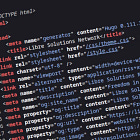New Website: Cyberfreedom.ca
Let's get down to business
There’s something very powerful about splitting up a huge task into tiny pieces and making it easy for people to work on the particular chunks. In hopes to demonstrate how this is done, cyberfreedom.ca is now launched to demonstrate Operation: Beehive. It is still very much a work in progress, but the seed is planted. A lot of basic questions need to be answered, but there’s lots to come!
Operation: Beehive
Bottom-up, decentralized, and permissionless strategies are at a premium. With the tools available to us, people from all walks of life are able to cooperate on incredible projects. Instead of relyin…
What is Cyberfreedom.ca?
Canadian Cyber Freedom is intended to be a resource for Canadians to identify legislative attacks on their digital autonomy and privacy. The site is a beehive because it’s using a version-control system git to manage changes. Once changes are accepted, they are automatically integrated with the site. Anyone is free to clone the repository and start making their own changes. Once they’ve published their version of the repository (or sent it directly) their updates can be integrated into the project.
The idea of keeping up with, and extensively detailing all the ways in which the government of Canada is working to undermine Canadians digital liberty is overwhelming. The hope is to recruit motivated volunteers to assist with building a resource that will help Canadians engage with their representatives to turn the tide in favor of liberty. While total success would be wonderful, even enough engagement to demonstrate the tactic would go a long way to change the game.
Why all the fuss?
Many hands make light work. The ability to get many people working together in a decentralized way is severely underestimated. The goal is to exemplify a process that with a little learning, allows everyone to maximize their own ability to contribute to larger projects.
The major challenges are two-fold:
The project has to be deliberately setup with this kind of workflow in mind. Some data formats or ways of managing information become much more complicated as projects gain participants or become larger.
It does require a bit of learning on the behalf of volunteers, in exchange for learning a useful skill, they’re able to build things that would be impossible for individuals.
On the other hand, there are also many advantages:
Anti-Fragile Information Sharing
It’s a lot harder to suppress information when a variety of people have a copy of it, that can be easily shared over many different mediums.
Highly Scalable
The more people who get involved, the more can get done quickly
Inherently Self-Hosted and Offline-First
It’s all just managing information, there is no requirement to use websites or services at all. They’re just convenient for access and sharing.
Optimal Trust
You may want the ability for people to contribute without necessarily trusting them with keys to the kingdom. Using git allows you to pull changes from anyone without having to give them control over your project.
Once you do want to trust collaborators to help you manage the project, it’s as simple as creating an account on your forge for them, and setting up permissions to the repository.
Division of Labor
The beehive model allows for tech people to focus on tech things (such as site hosting and configuration) while contributors can focus on their areas of expertise such as writing, editing, translation, or creating multimedia content.
What can be Accomplished?
Demonstrating how to decentralize collaboration online and offline is a phenomenal asset to those who wish to endure and oppose total top-down control. The goal is to primarily demonstrate how a task that appears to be too large to take on can be relatively simply transformed into a goldmine of opportunity for all involved. If this process was better understood, the broader community could adopt this model towards creating resources for other kinds of important issues.
Of course, it would be wonderful if cyberfreedom.ca becomes the go-to resource to equip Canadians to engage with their elected officials to gain new ground for digital autonomy in Canada. With a bit of effort this resource could track terrible legislation before it has time to pass and give citizens the confidence to oppose it together. If this proves successful, it would be even possible for people to write new proposals that would greatly enhance the privacy and free expression rights on Canadians.
Help appreciated
Are you interested in getting involved? Please let me know!
More information on how to get started is coming!
Thank you: A Personal Note
I want to thank everyone reading this at the moment, it’s been a very rough start for me but I am very excited for the future of this and other projects. I hope that even if you can’t contribute time that you’re willing to at least share the idea with others, so that we can all start to bring meaningful change together. Whether you’re reading this via email, the website, or RSS feed your support has meant a great deal and your feedback means a great deal.




Congratulations, Gabriel, and thank you for doing this important work!!
Great stuff Gabriel!
I look forward to talking about this later this week during our podcast talk.
Afterwards, I will share it with Jason Lavigne (see https://twitter.com/JasonLavigneMP) who is somewhat of a tech guy himself, and very much involved in the truth & freedom community in Canada. He has a lot of good contacts that could perhaps increase awareness of this project and help it grow.